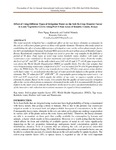Effect of Using Different Types of Irrigation Water on the Soil-To-Crop-Transfer Factor in Leafy Vegetables Grown Along Peri-Urban Areas of Kiambu County, Kenya
Abstract
The water used for irrigation has a significant effect on the way heavy elements accumulates in
the soil as well as how plants grown on those soils uptake elements. Therefore, this study aimed at
establishing the effect of using different types of irrigation water on the soil-to-plant transfer factor
for African nightshade (Solanum Scabrum Mill) grown in the peri-urban areas of Kiambu County,
Kenya. Randomized complete block design was used to grow the crop samples in the field for a
period of 30 days. Four types of water (tap water, borehole water, shallow well water and
wastewater) were considered as the four treatments and replicated four times. From the results,
the level of Cd2+ and Pb2+ in the soils which were 2.63 ± 0.10 and 3.77 ± 0.10 ppm respectively
was above the World Health Organization (WHO) acceptable limits. For the crop samples that
were irrigated using wastewater, a high level of Fe3+ was recorded 224.59 ±14.59 ppm though not
above the WHO limits. The soil-to-crop transfer factor values (TF) for crops grown using shallow
wells had a value >1, an indication that this type of water positively influences the uptake of these
elements. The TF values for CD2+ AND PB2+ IN crop samples grown using tap water were< 1 at
0.95 and 0.97 respectively which signify the ability of tap water to suppress uptake of heavy
elements by plants. Based on the results, it is notable that the quality of water used for irrigation
affects the way in which plants accumulates elements from the soils. It is recommendable for policy
makers in the study area to educate the farmers on the need to carry out phytoremediation as one
of the innovative risk-reduction interventions measures in regard to bioaccumulation.

